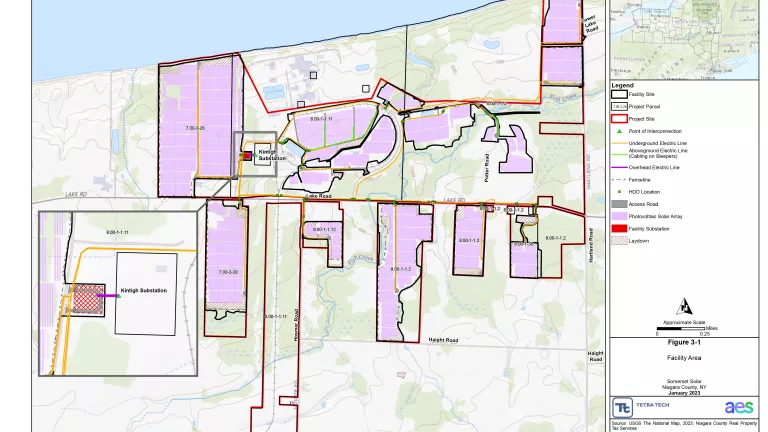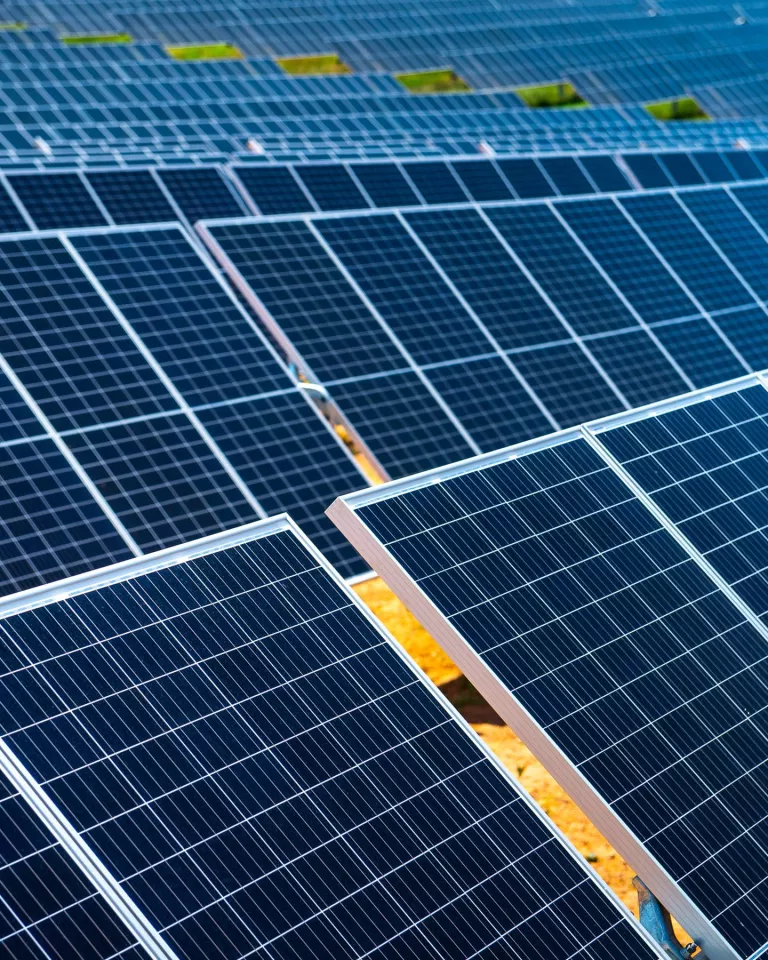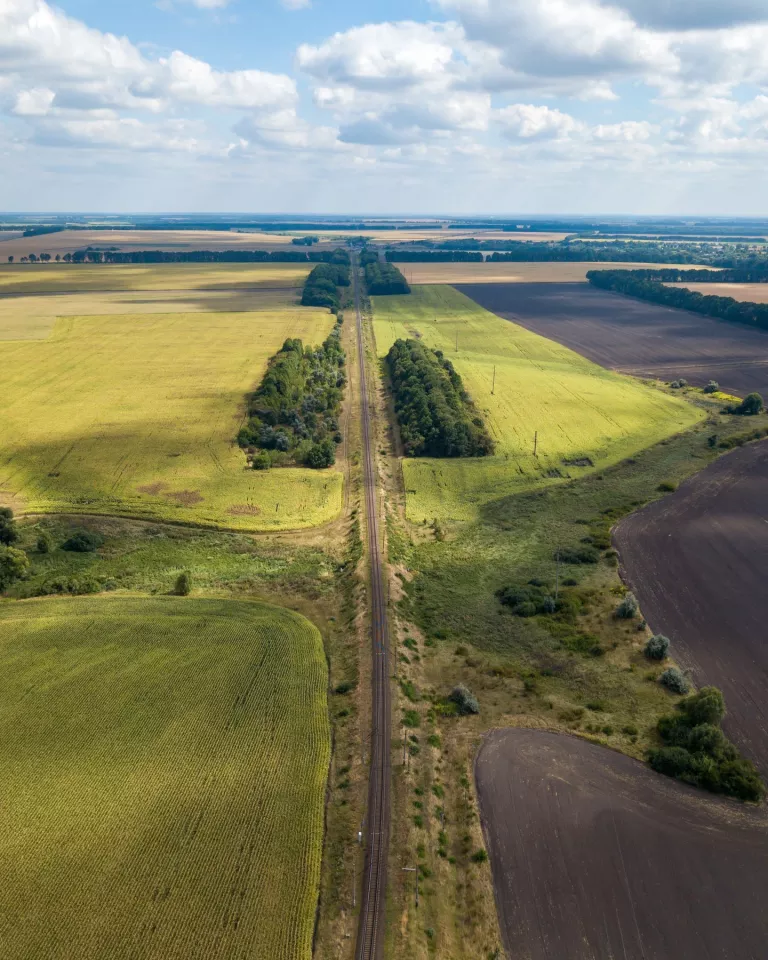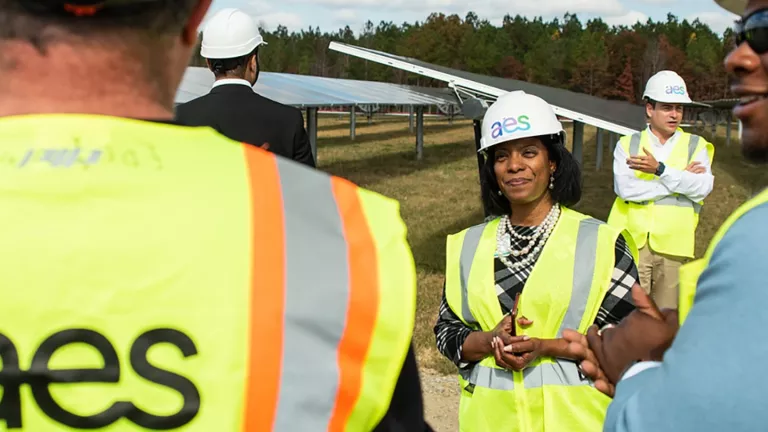
Project impacts
The 125 megawatt (MW) Somerset Solar project will support New York State’s climate goals and will have minimal impact on neighboring landowners, nearby communities, and surrounding landscapes. The Facility is to be located, in part, on the site of the former coal plant, Somerset Station, and has been designed to minimize impacts to the maximum extent practicable, with unavoidable impacts outweighing the economic and environmental benefits of the Facility.
Co-use is planned for the Facility and a preliminary co-use plan has been developed to incorporate thoughtful methods of land preservation and utilization in conjunction with the planned operational Facility. At AES, we understand the importance of land and are actively working to create synergies between renewable energy development and land use. Although these methods are not feasible at every project site, we continue to partner with researchers, farmers, and local stakeholders to assess site specific needs and advance the most feasible plan forward that incorporates co-use, dual-use or agrivoltaic system practices.
Specifically, stakeholders within the region will receive economic benefits from the Facility through construction, operation, and maintenance jobs, as well as expenditures for supplies and materials, lease payments to participating landowners, and tax payments to local communities. In addition, the Facility will promote public health and welfare by offering a sustainable alternative to generating electricity by non-renewable methods to meet New York State’s energy requirements. The Facility will contribute to a reduction in the amount of fossil fuel consumed and a corresponding reduction of global carbon emissions, which may result in a reduced rise in global ambient air temperature. This reduction in greenhouse gas emissions will contribute to improved environmental health overall. The Facility plays a crucial role for the community and the entire state of New York, as it will help meet New York State’s energy goal outlined in the 2015 SEP and 2020 Amendment to the 2015 plan: achieving 70% of electricity generated by renewable energy in New York by 2030. Lowering these emissions also improves air quality, which is beneficial to respiratory and public health.
The Applicant has conducted various surveys and studies throughout the 94-c process to assess potential environmental and community impacts, as well as aesthetic and visual impacts to the area surrounding the Facility Site. The Facility will not produce emissions of air or water pollution, will not produce odors, and will generate minimal noise. It will have a low profile relative to other types of development. Additionally, the Applicant intends to minimize impacts to community character through strategically placing vegetative screening, maximizing setbacks from residential uses, and avoiding sensitive resources. Impacts related to the construction and operation of the Facility are limited to:
-
Temporary and minor permanent impacts to agricultural land (hay and row crops), forested land, and successional shrubland. Areas that are temporarily impacted will be restored to their original condition following the completion of construction. While a portion of the Facility site will require removal of agricultural areas from agricultural production, these impacts are temporary considering that one of the benefits of solar generating facilities is that the impact to the land is minor, and after the useful life of the Facility (35 years), the land can be converted back to its original agricultural state. Of the 368 acres of agricultural land field-verified during site surveys, only approximately 6 acres will be permanently impacted by grading for access roads and equipment pads (i.e., inverters), and fence posts.
-
Fragmentation of forested habitat will be limited. The Facility has been sited to avoid existing hedgerows and vegetative barriers where possible.
-
USACE-jurisdictional wetland impacts are limited to approximately 0.09 acre (3,920 square feet) and therefore, no compensatory federal mitigation is required. This 0.09-acre area is also considered state-jurisdictional wetlands. The Applicant will work with the Office of Renewable Energy Siting (ORES) regarding mitigation to NYS-jurisdictional wetlands for unavoidable impacts of 0.09 acres.
-
There are no impacts to NYS-regulated waterbodies as part of the construction and operation of Facility. A minor amount (approximately 2 acres) of selective tree/brush cutting will occur within 50 feet of Fish Creek.
-
The Applicant has developed a net conservation benefit plan (NCBP) for potential take of occupied wintering habitat for northern harrier, which includes conservation of approximately 23 acres of suitable wintering grassland habitat for the species.
-
Traffic-related impacts associated with the Facility will be minor during construction. Once operational, the Facility is not anticipated to impact traffic through the Town of Somerset.
-
Noise and vibrational modeling have been conducted to confirm that impacts resulting from the construction and operation of the Facility will not exceed the design goals listed within the regulations of Section 94-c of the New York State Executive Law, through appropriate mitigation measures that have been incorporated into the Facility design.
-
A minor to moderate change to the landscape conditions is anticipated for most viewers within the Facility’s 2-mile Visual Study Area, primarily motorists/cyclists traveling along New York State Route 18/Lake Road. In accordance with Uniform Standards and Conditions of Section 94-c §900-6.4 (l), the Applicant will implement a Visual Impacts Minimization and Mitigation Plan, including visual contrast minimization and mitigation measures, a lighting plan, and landscape screening and planting plans.
94-c permitting process
The Accelerated Renewable Energy Growth and Community Benefit Act (the “Act”) was passed in April 2020 as part of the final state budget. The Act added a new section 94-c to the Executive Law, titled Major Renewable Energy Development ("Section 94-c”, "94-c", or "the 94-c permitting process"), which established a review process with uniform permit standards for New York State renewable energy projects.
Section 94-c established the Office of Renewable Energy Siting (ORES) within the NYS Department of State to provide a single forum for the environmental review and permitting of proposed major renewable energy facilities. This includes renewable energy systems with a nameplate generating capacity of 25 MW or more, co-located energy storage systems, and electric transmission facilities less than 10 miles in length. The final Section 94-c regulations were issued on March 3, 2021 and can be viewed here.
Prior to submitting a 94-c permit application, Somerset Solar is required to consult with the local agencies and stakeholders of the community in which the project will be located. ORES also requires that state agencies (e.g., NYSDEC) are consulted on wetland and stream delineations, threatened and endangered species, and archeological and cultural resources, if appropriate. Agency consultations should take place at the earliest point possible in the Applicant’s process. Following consultations with impacted agencies, 94-c Applicants must hold at least one meeting for community members. The Somerset Solar Virtual Community Meeting was held on December 15, 2021.
Outside of the 94-c public comment period and requirements, Somerset Solar is committed to ongoing stakeholder and community engagement;
From the date of its receipt of a permit application, ORES has 60 days to either make a completeness determination or share with the Applicant the permit application deficiencies. When the applicant receives a completeness determination, draft permit conditions will be issued by ORES for public comment. Within the comment period, the host municipality must submit a statement indicating whether the proposed renewable energy facility complies with applicable local laws. ORES must issue a final decision on the siting permit within one year of the date on which the application is deemed complete. See below for a full diagram of the 94-c process, from pre-application activities through the start of construction.
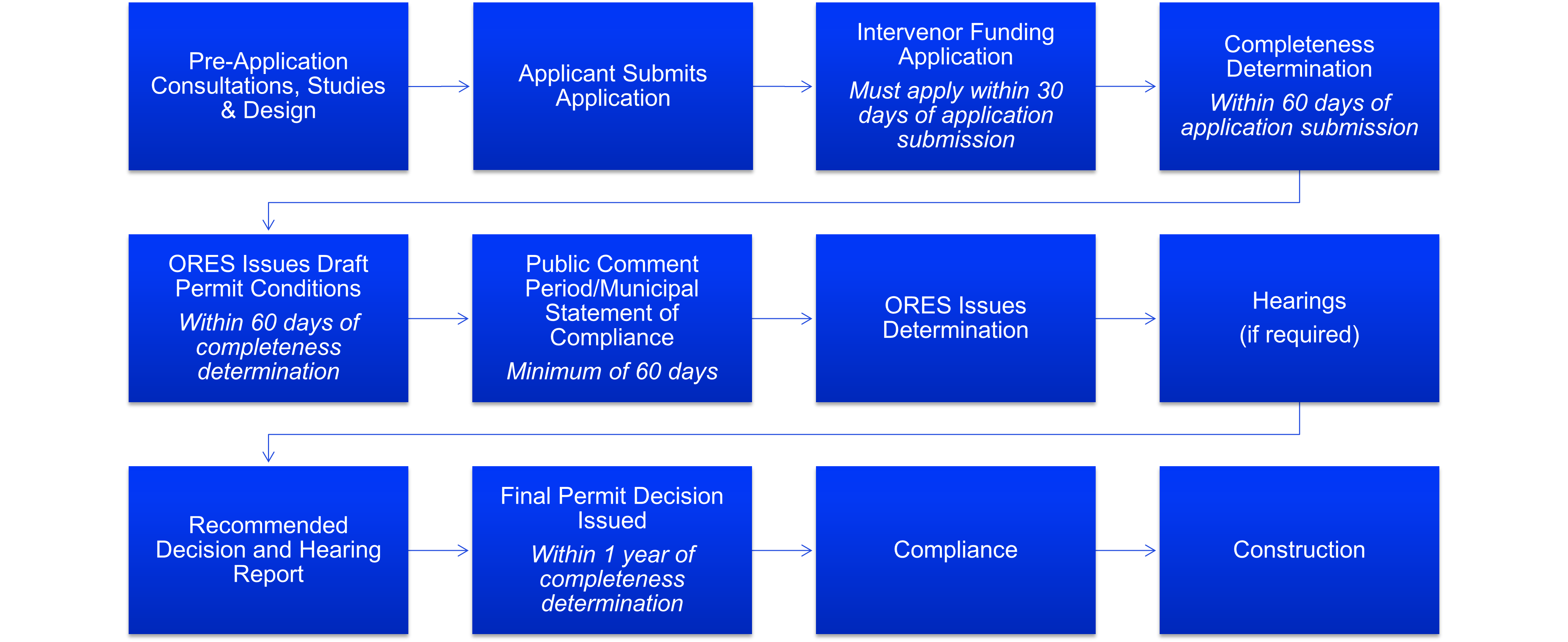
-
Application will be submitted on April 4th.
-
On March 24, 2023, Somerset Solar filed a 3 day notice of intent to file an application
-
On January 31, 2023, Somerset Solar filed an updated 60-day notice of intent to file a 94-c application
-
On December 15, 2021, Somerset Solar held the 94-c community meeting virtually via Zoom.
Join the Somerset Solar Master Stakeholder List
Joining the Master Stakeholder List maintained by AES enables you to receive mailings of the 94-c required notices. You can join this list by filling out the "Stay Updated" webform at the bottom of this page, by calling 866-757-7697 or by emailing somersetsolar@aes.com.
Subscribe to the service list
If you would like to monitor the proceedings of the Somerset Solar 94-c application, you can do so without the formal commitment of becoming a party in the proceedings. By subscribing to the service list of a case (Somerset Solar: Matter Number 22-00026), you will receive an e-mail with a direct link to the documents issued by the Public Service Commission PSC), such as orders, notices, and rulings. If you are unable or unwilling to receive electronic notification, you will receive hard copies of Commission-issued documents by regular mail. If you are a registered user of the NYS Public Service Commission's Document and Matter Management (DMM) System, you may submit your service list subscription by clicking here and Subscribe to Service List link at the bottom of the page.. Registration saves time and allows you to see and manage all of your service and party list subscriptions.
If you do not wish to register on the PSC's DMM System, you can download the Request for Service List form here. Please follow the instructions on the form.
Request party status
Generally, parties commit to contribute to the development of a complete record in a proceeding by conducting discovery, submitting testimony, briefs, or other formal written comments, and/or participating in evidentiary hearings, procedural conferences and other formal events conducted in the case. (Non-parties participate in PSC proceedings by filing informal comments, such as letters, in contrast to the formal comments filed by parties in response to Commission notices.) For some PSC proceedings, including rate cases, a person need not be a party to petition for rehearing of the Commission's final decision; however, in some other proceedings, only those who were parties in the case may petition for rehearing. The right to challenge a PSC decision in New York State Court may also be limited to those who were parties to the PSC proceeding. Under Commission rules, 16 NYCRR 4.3, you must seek permission to intervene as a party from the Administrative Law Judge (ALJ), if one is assigned to the case, or from the Secretary if there is no ALJ assigned. The standard for allowing intervention is whether your participation is likely to contribute to the development of a complete record or is otherwise fair and in the public interest; whether other parties are unfairly prejudiced is also considered.
If you are a registered user of the NYS Public Service Commission's Document and Matter Management (DMM) System, you may submit your request for party status by clicking here for Party Status link at the bottom of the page. Registration saves time and allows you to see and manage all of your service and party list subscriptions.
If you do not wish to register on the PSC's DMM System, you can download the Request for Party Status form here. Please follow the instructions on the form.
When you submit the request for party status here, you will be provisionally added to the party list, subject to the right of other parties to object and subject to the final determination of the ALJ or Secretary. You will be required to mail your request to anyone on the party list who cannot receive e-mail service.
Intervenor funding is money that Applicants make available to qualified, locally affected parties and municipalities to offset certain expenses they incur in participating in the state permitting process. These funds are meant to encourage early and effective public involvement in project development and permitting.
With the filing of its 94-c application, anticipated in March 2023, Somerset Solar will submit the required local agency account fee of $1,000/MW ($125,000). These funds can be sought by local community intervenors and host towns. 75% of funds are reserved for municipalities.
Any local agency or potential community intervenor seeking funding must submit a request for initial funding within 30 days of the date of application filing.
Requests for local agency account funds can be made via:
The ORES Request for Local Agency Account Funding form available in the Resources section of the ORES website
Or by email to general@ores.ny.gov
Or by mail to
Attention: Request for Local Agency Account Funding Office of Renewable Energy Siting
Empire State Plaza
240 State Street
P-1 South, J Dock
Albany, NY 12242
Further details regarding requests for local agency account funding will be provided on this website after the application is filed, on or about April 1, 2023.
If you have questions regarding the intervenor process, please contact the ORES office.
In addition to being viewable on this project website (see 'Somerset Solar 94-c Application', below) and the Project Document Matter Master on the DPS website, the Somerset Solar permit application available for viewing in print at the following location(s), during regular operating hours:
Barker Public Library: Town of Somerset, New York 8700 Haight Road, PO Box 368 Barker, NY 14012 (716)-795-3575
To learn more about the 94-c permitting process, please visit the Office of Renewable Energy Siting website at https://ores.ny.gov/.
-
The final 94-c regulations, effective as of March 3, 2021, are available at Chapter XVIII, Title 19 of NYCRR Part 900 (Subparts 900-1 – 900-15)
-
Resources related to the PSC Document Matter Master system, local agency account funds, and regulatory documents can be viewed on the ORES website at https://ores.ny.gov/resources
-
Information on the permit applications currently under review (including that of Riverside Solar) and those which have been deemed complete, can be found at https://ores.ny.gov/permit-applications
To submit any questions or comments regarding the 94-c permitting process, reach out to ORES by phone, email, written letter, or via this contact form on the ORES website (https://ores.ny.gov/)
-
(518) 473-4590
-
general@ores.ny.gov
-
Mailing Information (letters and envelopes):
Office of Renewable Energy Siting (ORES)
c/o: OGS Mailroom
Empire State Plaza
240 State Street
P-1 South, J Dock
Albany, NY 12242
Appendix 3-A_ Somerset Comprehensive Plan 2016 Update
Appendix 3-B_Somerset Local Waterfront Revitalization 2005
Appendix 3-C_Magnetometer Survey_Part 1 of 2
Appendix 3-C_Magnetometer Survey_Part 2 of 2
Appendix 3-D_Phase I ESA_Part 1 of 2_REDACTED
Appendix 3-D_Phase I ESA_Part 2 of 2_REDACTED
Appendix 3-D_Phase II ESA_REDACTED
Appendix 3-E_Adjacent Parcels
Appendix 3-F Coastal Assessment and Waterfront Assessment Consistency Tables
Appendix 3-G_Municipal Zoning Districts Tables
Exhibit 3 Location of Facilities
Figure 3-1_Facility Area
Figure 3-2_Project Interconnections
Figure 3-3_Limits of Clearing
Figure 3-4_Area Map
Figure 3-5_Existing Land Use
Figure 3-6_Existing Facilities
Figure 3-7_Properties
Figure 3-8_Zoning Districts
Figure 3-9_Protected Areas
Figure 3-10_Erosion Risk
Figure 3-11_Aerial Detail Study Area
Appendix 6-A_Site Security Plan
Appendix 6-B_Safety Response Plan
Appendix 6-C_Somerset Station Demolition Plan
Appendix 6-D_Ash Landfill (SWDA II) Grading Plan
Exhibit 6_Public Health, Safety and Security
Figure 6-1_Public Water Supplies
Figure 6-2_Emergency Response Resources
Figure 6-3_Existing Hazards
Appendix 7-A_Pre-Construction Noise Impact Assessment_Part 1 of 6
Appendix 7-A_Pre-Construction Noise Impact Assessment_Part 2 of 6
Appendix 7-A_Pre-Construction Noise Impact Assessment_Part 3 of 6
Appendix 7-A_Pre-Construction Noise Impact Assessment_Part 4 of 6
Appendix 7-A_Pre-Construction Noise Impact Assessment_Part 5 of 6
Appendix 7-A_Pre-Construction Noise Impact Assessment_Part 6 of 6
Exhibit 7_Noise and Vibration
Figure 7-1_Mitigated Full Operational Sound Levels
Figure 7-2_Mitigated Substation Sound Levels
Appendix 8-A Visual Impact Assessment_Part 1 of 6
Appendix 8-A Visual Impact Assessment_Part 2 of 6
Appendix 8-A Visual Impact Assessment_Part 3 of 6
Appendix 8-A Visual Impact Assessment_Part 4 of 6
Appendix 8-A Visual Impact Assessment_Part 5 of 6
Appendix 8-A Visual Impact Assessment_Part 6 of 6
Exhibit 8 Visual Impacts
Appendix 9-A_OPRHP Correspondence_Part 1 of 2
Appendix 9-A_OPRHP Correspondence_Part 2 of 2
Appendix 9-B_Tribal Outreach
Appendix 9-C_Phase IA Archaeological Investigation_REDACTED
Appendix 9-D_Historic Architecture Survey Report_REDACTED
Appendix 9-E_Phase IB Survey Report Addendum_REDACTED
Appendix 9-F_Unanticipated Discovery Notification Contact List
Exhibit 9 Cultural Resources
Appendix 12-A_Wildlife Site Characterization Report_REDACTED
Appendix 12-B_Spring Breeding Bird Survey Report_REDACTED
Appendix 12-C_Wintering Grassland Raptor Survey_REDACTED
Appendix 12-D_T and E Species Agency Correspondence_REDACTED
Appendix 12-E_Field by Field Additional Information Memo_REDACTED
Appendix 12-F_Preliminary NCBP_REDACTED
Exhibit 12_New York State Threatened and Endangered Species
Appendix 13-A_Well Survey Letters-Receipts
Appendix 13-B_SWPPP_Part 1 of 4
Appendix 13-B_SWPPP_Part 2 of 4
Appendix 13-B_SWPPP_Part 3 of 4
Appendix 13-B_SWPPP_Part 4 of 4
Appendix 13-C_ORES Jurisdictional Letters
Appendix 13-D_Year 2021 Somerset Solid Waste and Groundwater Monitoring
Exhibit 13 Water Resources and Aquatic Eoclogy
Figure 13-1_Wells and Soil Borings
Figure 13-2_Delineated Surface Water
Figure 13-3_Drinking Water Sources
Appendix 15-A Agricultural Plan
Appendix 15-B Drainage Remediation Plan
Appendix 15-C_Communications Log for Drain Tile Due Diligence
Appendix 15-D_Real Property Assessment
Appendix 15 E_Agrivoltaic Solutions Site Design
Exhibit 15 Agricultural Resources
Figure 15-1_Agricultural Districts
Figure 15-2_Ag Value
Figure 15-3_USDA NASS
Figure 15-4_Existing Energy Infrastructure
Figure 15-5_Active Ag Land
Figure 15-6_Landowner Imposed Restrictions
Figure 15-7_Drainage Systems
Figure 15-8_Soils
Figure 15-9_Mineral_Soil_Groups
Appendix 16-A_Transportation Data and Figures
Appendix 16-B_Turning Movement Collection
Appendix 16-C_Accident Summary Data
Appendix 16-D_Turning Movement Diagrams
Appendix16-E_State and County Roadway Permits
Exhibit 16 Effect on Transportation
Figure 16-1_Emergency Responder Routes
Figure 16_2_School Bus_Routes
Project resources
- August 2023 | Updated Somerset Project Layout
- March 24, 2023 | 3-day notice filing
- January 31, 2023 | Somerset Solar 60 day notice of intent to file a 94-c application
- December 15, 2021 | 94-c Virtual Community Meeting Presentation | 94-c Virtual Community | Meeting Video Recording | 94-c Virtual Community Meeting Q&A
- June 16, 2021 | Open House Community Meeting Presentation Materials
All materials filed in the Somerset Solar 94-c proceedings can be found here.
We will provide security fencing that will fully encompass the solar fields. Any wires outside of our security fence will be buried. As such, no part of our solar project will be accessible to the public. Within the fence line, all solar equipment will be grounded and touch safe, fully compliant with all applicable codes and accessible only to qualified personnel, with the exception of guided tours. Orientation will be offered to local first responders to educate them about the project, the equipment and access, and response procedures in case of unexpected events. Contact information for our monitoring and response center will be provided and posted on the project fence to ensure the public can easily reach project representatives.
When a solar project reaches the end of its project life, the project is responsible for executing the approved Decommissioning Plan, including abiding by all local and state decommissioning requirements. This includes the removal, recycling, and disposal of all solar arrays, racking, equipment, and other structures associated with the project, as applicable. The land surface within the project area will be sensibly restored to pre-project conditions to allow a return to agricultural use or other uses consistent with the land-use policies at the time.
The project will not require the use of fuel once operational and will not generate emissions. The energy produced by the facility will contribute to reducing air pollution and is anticipated to offset more than 100,000 tons of carbon dioxide emissions every year.
AES has worked in cooperation with the community throughout the development of the proposed Somerset Solar project. Special considerations are made for concerns raised by the community and AES continues to incorporate solutions to respond accordingly. Please see examples listed below.
-
Limiting footprint south of Route 18: Even while facing environmental constraints that have limited Somerset Solar’s footprint, AES developers have not expanded the footprint of the Somerset Solar south of Route 18, or at all. Somerset Solar only utilizes parcels owned by the Somerset Operating Company and therefore Somerset Solar has not approached or disturbed any additional landowners.
-
Vegetative screening: To help aid in visual concerns raised by nearby landowners, the AES team has added visual screening wherever possible. Additionally, AES is utilizing agricultural fencing instead of traditional chain link fencing on the site for a more visually appealing design.
-
Cooperation with local organizations: Conversations between the AES team and community local organizations have established opportunities through our Social Impact programs, contributions and sponsorships available in 2023.
AES’ community engagement philosophy is to create a strong foundation at the local level and build additional layers of support at the regional and state levels. The Somerset Solar team will continue this outreach and is committed to responding respectfully to community feedback and concerns through various channels.
Somerset Solar is a unique renewable energy project as it will be built on a former coal plant site, be self-contained on that site, utilize the existing electrical interconnection, and offer a beneficial re-utilization of a dormant coal plant site. Somerset Solar has the potential to be a national model that can be replicated elsewhere.
Contact us
For any inquiries or comments about Somerset Solar please contact us directly at:
Project Email: somersetsolar@aes.com
NY Toll-Free Phone Number: 866-757-7697 (866-SLRPOWR)
Office Address:
292 Madison Avenue
15th Floor
New York, NY 10017
New York office hours
Have a question or comment for AES about our work in your community? Give us a call during these hours to talk to a company representative.
-
Every Monday from 11:00 AM to 1:00 PM ET
-
Every Thursday from 4:00 PM to 6:00 PM ET
-
Call our New York office at 866-757-7697 (866-SLRPOWR)
